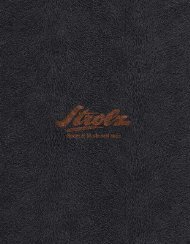Making the Most of Your Content - A Publisher's Guide to the Web
At Google we’re frequently asked how web search works, and how web publishers can maximise their visibility on the Internet. We’ve written this short booklet to help you understand how a search engine ‘sees’ your content, and how you can best tailor your
At Google we’re frequently asked how web search works, and how web publishers can maximise their visibility on the Internet. We’ve written this short booklet to help you understand how a search engine ‘sees’ your content, and how you can best tailor your
You also want an ePaper? Increase the reach of your titles
YUMPU automatically turns print PDFs into web optimized ePapers that Google loves.
Glossary<br />
Cache link<br />
A snapshot <strong>of</strong> how a page appeared <strong>the</strong> last time Google visited it. A cached copy<br />
allows users <strong>to</strong> view a page even when <strong>the</strong> live version is unavailable, although <strong>the</strong><br />
content may differ slightly. To view a cached copy, click on <strong>the</strong> ‘cached’ link that<br />
appears underneath a search result.<br />
Cloaking<br />
Showing search engines different content than what you show users.<br />
CMS (<strong>Content</strong> Management System)<br />
A s<strong>of</strong>tware system used <strong>to</strong> manage content from computer, image, and audio fi les<br />
<strong>to</strong> web content.<br />
Crawler<br />
S<strong>of</strong>tware used <strong>to</strong> discover and index URLs on <strong>the</strong> web or an intranet.<br />
Crawling<br />
The process used by search engines <strong>to</strong> collect pages from <strong>the</strong> web.<br />
Dynamic content<br />
<strong>Content</strong> such as images, animations, or videos which rely on Flash, JavaScript,<br />
frames, or dynamically generated URLs.<br />
File extension<br />
The name <strong>of</strong> a computer fi le (.doc, .txt, .pdf, etc.) <strong>of</strong>ten used <strong>to</strong> indicate <strong>the</strong> type<br />
<strong>of</strong> data s<strong>to</strong>red in <strong>the</strong> fi le.<br />
HTML (Hypertext Markup Language)<br />
A mark-up language used on <strong>the</strong> web <strong>to</strong> structure text.<br />
To index<br />
The process <strong>of</strong> having your site’s content added <strong>to</strong> a search engine.<br />
Keyword<br />
A word that is entered in<strong>to</strong> <strong>the</strong> search box <strong>of</strong> a search engine. The search engine<br />
<strong>the</strong>n looks for pages that include <strong>the</strong> word or phrase.<br />
Meta tags<br />
A tag in <strong>the</strong> HTML that describes <strong>the</strong> content <strong>of</strong> a web page. Meta tags can be<br />
used <strong>to</strong> control indexing <strong>of</strong> individual pages in a website.<br />
Mirror site<br />
A duplicate web page; sometimes used <strong>to</strong> fool search engines and try <strong>to</strong> optimise<br />
indexation and web rankings <strong>of</strong> a website.<br />
18 19

















